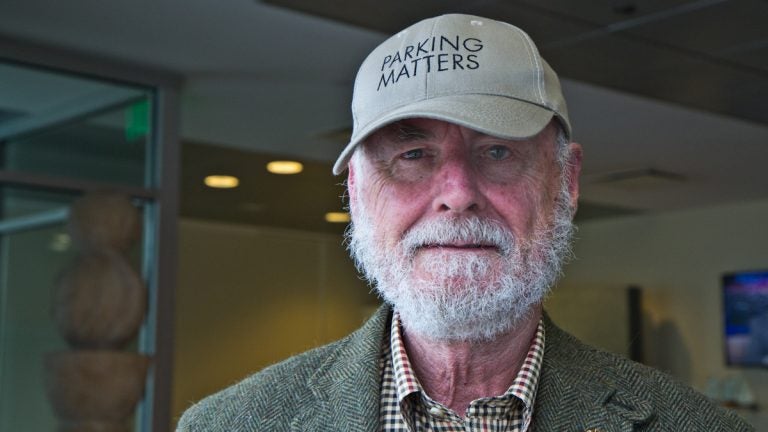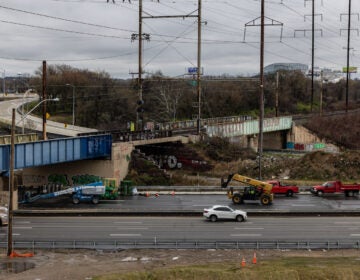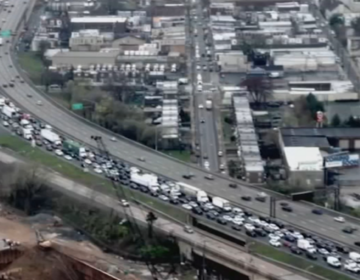‘Parking Guru’ advises Philly: Don’t require more, manage what you have
PlanPhilly spoke with UCLA's Donald Shoup, one of the nation’s foremost experts on parking policy, about mandatory minimums and alternative ideas.

Donald Shoup, author of "The High Cost of Free Parking." (Kimberly Paynter/WHYY)
In City Hall, the parking wars are raging again.
Back in 2012, Philadelphia’s antiquated zoning code got an overhaul. Policymakers enacted widespread changes, in some cases bringing the code in line with modern practices that seek to discourage sprawling, auto-centric development.
Almost since the reform went into effect, however, some City Council members — led by Council President Darrell Clarke — have been trying to undermine a key section of the code by forcing developers to build more off-street parking with residential developments.
It isn’t hard to see why district council members have pursued this change. After decades of population loss, many older rowhouse neighborhoods around Center City are seeing a flood of newcomers. Competition for free on-street parking is suddenly intense. Residents aren’t happy that it’s harder to park in front of their homes. And when civically engaged residents aren’t happy, neither are their council representatives.
But is increasing so-called “mandatory parking minimums” really the best way address the issue? A host of interest groups — from real estate developers, to affordable-housing advocates, to the city’s most sophisticated civic groups — have argued, and are still arguing, against the parking requirements Clarke and his allies are pushing for.
PlanPhilly spoke with the University of California Los Angeles’s Donald Shoup, one of the nation’s foremost experts on parking policy, about mandatory minimums and alternative ideas. Dubbed “The Parking Guru,” Shoup is the author of “The High Cost of Free Parking,” a staple of urban-policy courses around the world. His proposals have been adopted by dozens of cities and towns.
This interview has been edited for concision and clarity.
—
We have a bill backed by our City Council president that would sharply increase our mandatory parking minimums. It is stirring up quite a bit of controversy. [Right now, Philadelphia actually has quite low mandatory minimums, and the latest bill would increase them in rowhouse neighborhoods, old factory districts, and commercial corridors, as well as for mid-size apartment buildings and in outlying garden-apartment sections of the city.]
If you increase parking requirements, it means you’ll have more cars and fewer people. The parking is expensive, and someone has to pay for it, so the price gets rolled into higher rents in the buildings that have more parking. Even those who don’t own cars have to pay the higher rents to finance the parking that they don’t use. But some cities, especially historic cities, are looking to manage the on-street parking better rather than just requiring more off-street parking.
How would that work?
When people say parking requirements should be raised because there’s no parking, they usually mean that the curb parking is congested. If there isn’t enough off-street parking then people will park on the street.
But cities can manage their on-street parking by limiting the number of parking permits to the number of spaces that are available. So if you live in a district and you have a parking permit, you are pretty much guaranteed a place to park. They can also manage the meters better by adjusting prices [in real time] so there are always one or two open spaces on every block. People can’t say there is a shortage of parking if they always see one or two open spaces everywhere.
I think the city ought to step up and take responsibility for the parking that it does own, on the street, and manage it better rather than blaming developers for not having enough off-street parking.
Do you think that Philly has a uniquely fraught parking situation? Many of the city’s neighborhoods were built out before World War II, before mass car ownership became the norm. There are so many dense rowhouse neighborhoods that were not built to accommodate families with multiple cars. Parking disputes seem to get very ugly, very quickly. A recent study found that the parts of the city where parking is most valued are those older rowhouse neighborhoods close to downtown. This is a long way of saying: Do you think our parking problems are uniquely aggravating?
Not at all. Every city thinks its parking problem is unique, but Philadelphia is no different than New York or Boston or San Francisco. If an available parking space adds to the value of a housing unit, developers have an incentive to build that parking. Reducing parking minimums doesn’t mean there won’t be any parking. It just means the city won’t be telling developers how many parking spaces to provide.
And if parking is that valuable, it’s a mistake for the city to give it away for free. If something is free, will there ever be enough of it? We have parking that’s free for cars and housing that’s expensive for people. We have our priorities the wrong way around. If you have people willing to live near downtown with one car or none, the answer is not to add a lot more parking. These high prices for parking suggest that the city is mismanaging a very valuable asset.
Some cities are increasing the price they charge for on-street parking permits and using that money to repair sidewalks and replant street trees. One town in California, when they started charging for curb parking, they started giving free Wi-Fi to everyone in the neighborhood.
If you told people that we are going to charge a more market-rate price for parking, you have to tell them the money won’t disappear into City Hall.
That sounds like an interesting idea, and it makes a lot of rational sense. But when local politicians or community groups hear these ideas, they seem to very rarely advocate for such policies.
It shouldn’t just make economic sense. It needs to make political sense. The way to get the political [capital] is to spend the money earned by better parking management right on the street, where you are managing the parking. People need to leave their front door and see the improvements.
All that money has to come back to the people who pay for parking and to those who don’t own cars, so you get a majority of people in support. We pay for parking, we get free Wi -Fi, smooth sidewalks, extra police protection, pressure-washed sidewalks every two weeks. That will make political sense. You can’t just look at things from the economic point of view. From the economic point of view, charging for street parking is the thing to do, but from the political perspective you have to spend the money properly. You have to show people benefits.
Why do you think people aren’t enticed by these ideas?
Because they aren’t offered these options. People are offered parking meters or no parking meters. Who wants that? It’s all pain and no gain. But if the money comes right out of the other side of the parking meter and improves your neighborhood, that will build support.
They are called parking-benefit districts, and they are spreading. Some historic cities in California have been beautifully restored with parking-meter money. Clean up the alleys, pay for historic streetlights, street furniture.
I enjoyed my [2016] trip to Philadelphia. I think the reason visitors like walking around Philadelphia is because there aren’t a lot of parking garages or parking lots. Philadelphia is beautiful. But it’s a lack of parking that people like to see. They want to see stores, historic houses. Garages and lots simply interrupt that.
WHYY is your source for fact-based, in-depth journalism and information. As a nonprofit organization, we rely on financial support from readers like you. Please give today.







